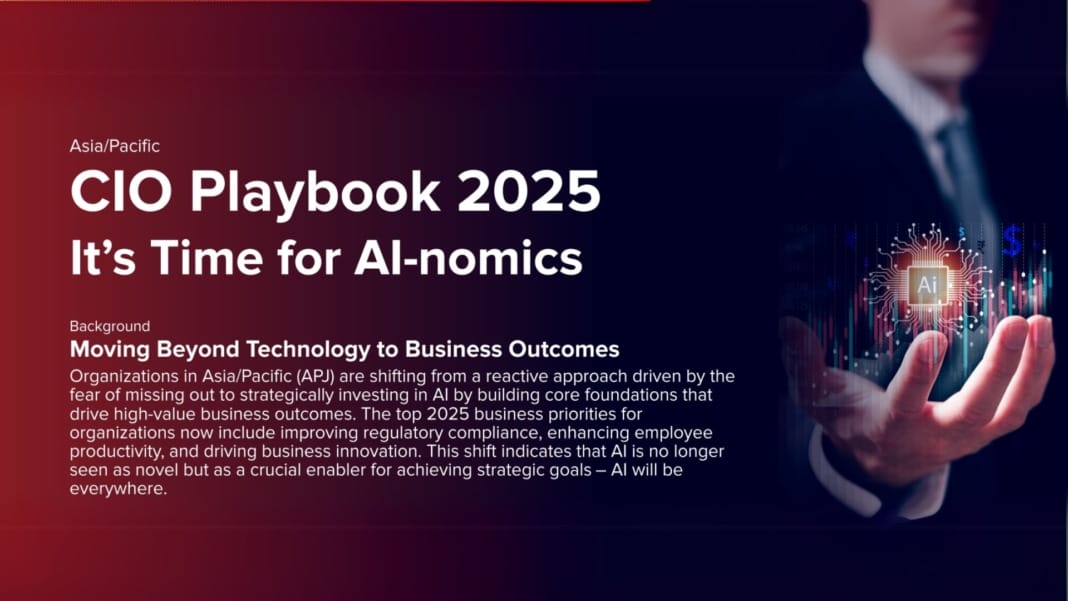A new study by Lenovo, in collaboration with IDC, has revealed that ASEAN+ countries are leading the Asia Pacific (AP) region in hybrid AI adoption, with 68% of organisations now using on-premise or hybrid infrastructures to power AI workloads. The findings were released on 26 March as part of the third edition of Lenovo’s CIO Playbook 2025, titled It’s Time for AI-nomics. The study surveyed over 2,900 business and IT decision-makers globally, including more than 900 respondents from 12 Asia Pacific markets.
While ASEAN+ is ahead in infrastructure adoption, the region still lags behind in overall AI implementation. Currently, 47% of organisations in the region are either evaluating or planning to adopt AI within the next year. This falls below the averages for Asia Pacific (56%) and globally (49%). The main obstacle to faster adoption continues to be the difficulty in proving return on investment (ROI).
Singapore stands out within the region as an advanced hub for AI maturity and infrastructure. In contrast, other ASEAN+ countries are at earlier stages of adoption due to resource limitations and a lack of expertise.
Balancing experimentation with long-term scale
Organisations across Asia Pacific are expecting an average ROI of 3.6 times from their AI investments, suggesting a cautious yet strategic approach to scale AI solutions. In ASEAN+, the gradual adoption pace reflects an intent to focus on improving supply chain operations, boosting regulatory compliance, and enhancing employee productivity.
However, several hurdles remain. Businesses in the region face ongoing challenges around data management, data security, and a shortage of AI talent, all of which continue to delay implementation.
“Delivering ROI for AI is a long-term endeavour that requires balancing AI experiments with those that can be scaled,” the report noted, adding that a considered approach is essential for sustainable impact.
Governance and compliance rise as key priorities
A significant shift in priorities among CIOs is also emerging. Governance, risk, and compliance (GRC) has jumped 12 places to become the top priority for IT leaders in the Asia Pacific. Yet despite this heightened focus, implementation remains low, with only 25% of AP organisations and 24% of those in ASEAN+ reporting fully implemented enterprise AI GRC policies. This is in line with global trends.
“Business priorities are shifting in Asia Pacific,” said Sumir Bhatia, President of Lenovo’s Asia Pacific Infrastructure Solutions Group. “For 2025, governance, risk, and compliance have jumped 12 spots to become the top priority, highlighting the focus on secure and responsible AI. Employee productivity has also climbed from #7 to #2, underscoring its growing importance. Lenovo is committed to making AI accessible, ethical, and impactful—helping businesses of all sizes thrive in the AI era.”
Effective AI governance requires several components including ethical frameworks, explainability, model oversight, and data privacy protections, all with integrated human involvement to ensure accountability.
GenAI spending grows as use cases expand
Generative AI (GenAI) is increasingly influencing enterprise workflows. In 2025, 42% of AI spending in ASEAN+ is expected to be directed towards GenAI applications. Customer service has emerged as the leading use case in ASEAN+, while IT operations dominate in the broader Asia Pacific region.
There are also key regional differences. In Asia Pacific, cybersecurity and software development rank as the second and third most common AI applications. Meanwhile, ASEAN+ prioritises IT operations and engineering or research and development as the next most significant use cases after customer service.
The shift toward GenAI reflects growing interest in automating repetitive tasks and improving response efficiency in customer-facing operations, among other uses.
Hybrid infrastructure preferred for AI workloads
Across the Asia Pacific, 65% of organisations now favour on-premise or hybrid infrastructure over public cloud for AI workloads. These preferences are driven by needs for secure, low-latency environments and operational flexibility. ASEAN+ countries are slightly ahead, with 68% of organisations already using hybrid or on-prem setups for their AI workloads, while only 19% rely solely on public cloud.
“Hybrid architectures offer the best of both worlds—scalability and control,” said Kumar Mitra, Managing Director and Regional General Manager for CAP and ANZ at Lenovo ISG. “Globally, 63% of organisations choose on-premise and hybrid infrastructures for AI, and ASEAN+ is leading with a higher adoption rate. This demonstrates a clear focus on driving innovation while ensuring security and compliance for the unique demands of AI. With its end-to-end cutting-edge AI solutions, smarter infrastructure, and strategic partnerships, Lenovo is driving Smarter AI for all.”
AI PCs and skilled partnerships shape future adoption
AI-powered PCs are also gaining traction. In Asia Pacific, 43% of organisations have already reported improved productivity from these devices. ASEAN+ markets show promising intent, with 65% of organisations currently in the planning stage for adopting AI PCs. As performance outcomes become clearer, this number is expected to grow.
Meanwhile, there is rising demand for professional AI services. In ASEAN+, 44% of CIOs are already using such services, and another 56% are planning to do so. These partnerships are proving essential in bridging internal skill gaps, managing data more effectively, and maintaining cost efficiency.
“AI adoption is not just about the short-term gains. Organisations need to invest in the efficiency of the design, deployment and integration of AI solutions to their operations that enable tracking of the impact. Professional AI services play a key role here and help organisations successfully adopt AI through outcome-led approach,” said Fan Ho, Executive Director and General Manager of Lenovo Asia Pacific’s Solutions and Services Group. “Solutions like Lenovo’s AI Fast Start further accelerate this process, helping businesses quickly pilot, optimise, and scale AI initiatives with expert guidance and tested frameworks.”
As ASEAN+ continues to lead in hybrid infrastructure adoption and ramps up investment in GenAI and AI PCs, organisations in the region are setting a strong foundation for long-term, ROI-driven AI success.





